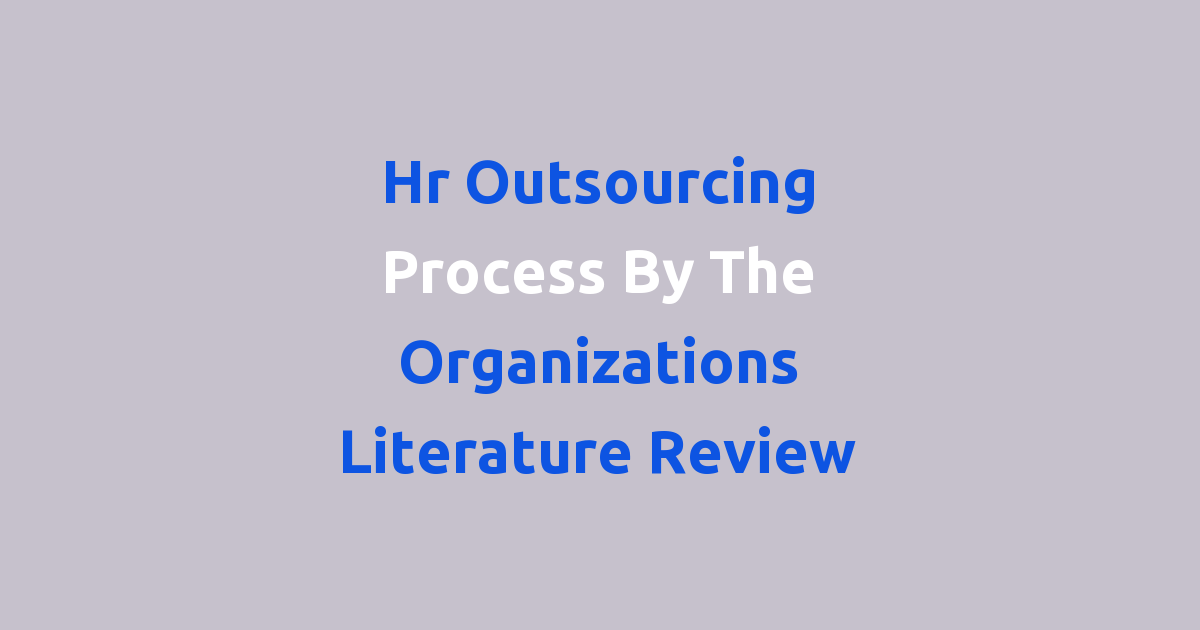Review of literature on HR outsourcing processes in organizations.
Introduction
Human Resource (HR) outsourcing has become a common practice among organizations in recent years. It involves the delegation of HR functions to external service providers, allowing organizations to focus on their core competencies. This literature review aims to examine the HR outsourcing process by organizations, highlighting the advantages and disadvantages of this practice.
Problem Statement
Many organizations face challenges in managing their HR functions efficiently and effectively. This includes recruitment, payroll processing, employee benefits administration, and training. By outsourcing these functions, organizations can reduce costs and improve efficiency. However, there are also risks associated with HR outsourcing, such as loss of control over critical HR functions and data security concerns.
Existing System
In the existing system, organizations typically handle their HR functions in-house. This involves hiring HR professionals to manage recruitment, payroll, benefits administration, and training. While this approach allows organizations to maintain control over their HR functions, it can be costly and time-consuming. Additionally, organizations may not have the expertise or resources to effectively manage all HR functions in-house.
Disadvantages of HR Outsourcing
Despite the potential benefits of HR outsourcing, there are several disadvantages to consider. One of the main disadvantages is the loss of control over HR functions. When organizations outsource their HR functions, they rely on external service providers to effectively manage these functions. This can result in communication gaps, errors, and delays in HR processes.
Another disadvantage of HR outsourcing is the risk of data security breaches. Organizations must entrust sensitive employee data to external service providers, which can pose a security risk. If this data is compromised, it can have serious consequences for the organization and its employees.
Proposed System
To address the challenges associated with HR outsourcing, organizations can implement a hybrid model that combines in-house HR functions with outsourced services. This approach allows organizations to retain control over critical HR functions while leveraging the expertise of external service providers for specialized tasks.
By adopting a hybrid HR outsourcing model, organizations can achieve cost savings, improve efficiency, and reduce risks associated with outsourcing. This approach also allows organizations to scale their HR functions according to their needs, providing flexibility and agility in managing HR processes.
Advantages of HR Outsourcing
There are several advantages to HR outsourcing that organizations can benefit from. One of the main advantages is cost savings. By outsourcing HR functions, organizations can reduce overhead costs associated with hiring and training HR professionals. This can result in significant cost savings for organizations, allowing them to reallocate resources to other areas of the business.
Another advantage of HR outsourcing is improved efficiency. External service providers are specialized in HR functions and can perform these tasks more efficiently than in-house teams. This can result in faster turnaround times, reduced errors, and improved accuracy in HR processes.
Features of HR Outsourcing
HR outsourcing services typically include a range of features to support organizations in managing their HR functions. Some common features include recruitment services, payroll processing, benefits administration, training and development programs, and compliance management. External service providers may also offer additional services, such as employee engagement initiatives, performance management systems, and HR analytics.
Organizations can customize their HR outsourcing services to meet their specific needs and requirements. This allows organizations to tailor their HR functions according to their industry, size, and business objectives. By leveraging these customizable features, organizations can achieve greater value from their HR outsourcing partnerships.
Conclusion
In conclusion, the HR outsourcing process by organizations presents both opportunities and challenges. By assessing the advantages and disadvantages of HR outsourcing, organizations can make informed decisions about their HR strategy. Implementing a hybrid HR outsourcing model that combines in-house functions with outsourced services can provide organizations with the flexibility, efficiency, and cost savings they need to succeed in today’s competitive business environment.

